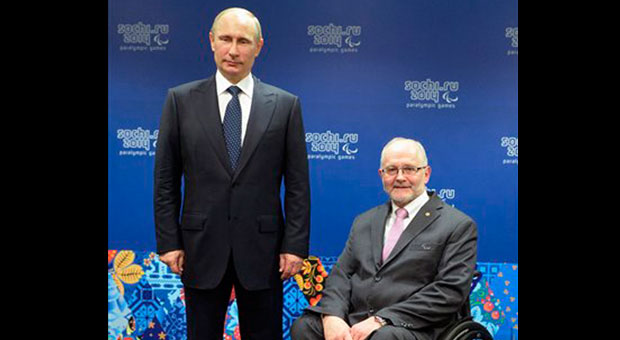
Russian President Vladimir Putin, left, and International Paralympic Committee President Philip Craven pose at a meeting with International Paralympic Committee board members and honorary council members before the opening ceremony of the 2014 Winter Paralympics in Sochi, Russia, Friday, March 7, 2014. AP
PARIS, France—With just over a year to go before the Rio Paralympics, International Paralympic Committee (IPC) president Philip Craven told AFP he is confident the 2016 Games will be a record-breaking success.
The Paralympics will run from September 7 to 16 next year, just after the Olympics in the Brazilian city, and Craven believes the combination of the Brazilians’ love of sport and the dramatic backdrop provided by Rio de Janeiro itself will bring improved ticket sales and a record television audience.
“If you look at numbers, we’ve got more athletes than we had in London (in 2012)—4,350—and 22 sports,” he said in an interview with AFP to discuss preparations for the Games.
“We’re expecting to break for the first time the four billion cumulative TV viewer figure. We’ve got far more broadcasters already signed up than we had for London at this time, so things are looking really great.”
The one-year countdown will be marked by the holding of a Paralympic Festival next Monday, September 7, at the city’s Lagoa Rodrigo de Freitas, the lake overlooked by the iconic statue of Christ the Redeemer.
While most headlines in the build-up to an Olympics and Paralympics are usually centered around the race to get venues and infrastructure ready, Craven says the festival—which will see the likes of London 2012 stars Jason Smyth of Ireland and Australia’s Evan O’Hanlon compete over 100 meters—will provide a glimpse of what to look forward to.
“It’s very similar to what we did with one year to go in Trafalgar Square in London, and then we launched the tickets, and that’s what we’re doing in Rio, where we are hoping to sell 3.3 million as opposed to 2.8 million in London.”
While it has tended to be overshadowed by the Olympics in the past, London 2012 was an enormous success for the Paralympic movement, but Craven insists Rio can match that.
“You couldn’t wish to go to a city that’s more vibrant. (Brazilians are) incredible…lovers of sport,” he said ahead of a Games that will welcome two new events for 2016 in the shape of paracanoe and paratriathlon.
“The triathlon is on Copacabana Beach with the Sugar Loaf right behind and the canoe is in the Lagoa with the Christ the Redeemer looking down from up on high and you couldn’t wish for more amazing backdrops, particularly for television.”
‘A long process’
This will be a particularly significant Paralympics for Craven given that he is serving his final four-year term as IPC president after being elected for a fourth time in 2013.
His eighth and last Paralympics in the role follows involvement at five Games as a paralympian in wheelchair basketball from 1972 to 1988 and also in swimming in 1972, and his contribution to disabled sport led to him being given a knighthood by Queen Elizabeth II in 2005.
Concerns have been raised about the lack of wheelchair access for disabled athletes and spectators in Rio, with 2016 organizing committee spokesman Mario Andrada last week telling AFP that making Rio accessible remained “a huge job.”
However, Craven, who is now 65 and was paralyzed in a rock climbing accident in 1966, tempered concerns by calling for patience.
“I think what we have to take into account here is that, if the Paralympics hadn’t come, then there would be very, very little change at all, and this takes time,” he said.
“What we’ve experienced in the past with Paralympic Games, if we look back to Beijing in 2008, there was an incredible transformation in accessibility in the whole of China, and the same happened following Sochi in Russia (in 2014), and this will happen in Rio.
“It’s a long process. From our experience, most of the changes will take place post the Games, and not prior.”
RELATED STORY
Rio Paralympics toils in face of ‘huge job’